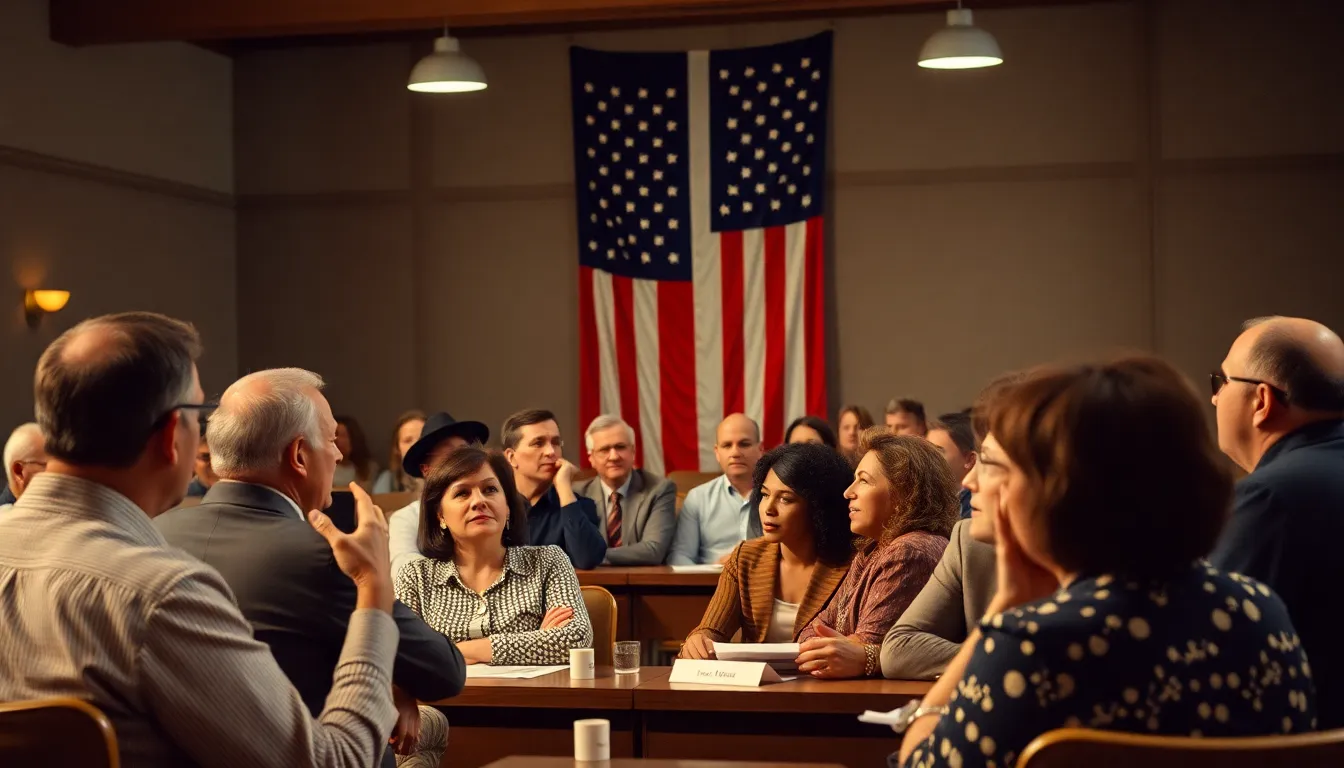Table of Contents
ToggleIn a world where political news can feel like a never-ending rollercoaster, staying informed can be both a necessity and a headache. One moment, a debate ignites passionate discussions, and the next, a tweet sends shockwaves through the media. It’s like trying to follow a soap opera where the plot twists are as unpredictable as a cat on a hot tin roof.
Overview of Political News
Staying updated with political news requires careful attention due to the rapid pace of events. Many factors contribute to the unpredictability of political spheres. Political news influences everything from government policies to public opinion.
Social media serves as a powerful tool, broadcasting the latest developments instantly. Information spreads rapidly, creating a need for critical analysis and fact-checking. Engaging with multiple news sources ensures a well-rounded understanding of current affairs.
Polls and surveys play a vital role in gauging public sentiment. In 2023, data revealed a significant shift in voter priorities compared to previous years. Economy, healthcare, and climate change emerged as top issues for many voters.
Analyzing local, national, and global perspectives provides deeper insights. For instance, a recent election cycle highlighted regional differences in legislative priorities.
Reports often include expert opinions and detailed explanations of policy implications. Understanding these nuances fosters informed decision-making among citizens. Therefore, comprehending political news goes beyond mere headlines.
Maintaining a critical eye on the information presented helps in navigating biases. Awareness of the media’s role in shaping narratives can enhance one’s understanding of political discourse.
Overall, political news functions as a crucial element in democratic societies. Engaging with it promotes active citizenship and informed voting behaviors.
Importance of Political News

Political news plays a vital role in democratic societies. It keeps citizens informed about developments that affect their lives.
Informing the Public
Informed citizens make better decisions. Political news equips the public with the necessary knowledge to participate in discussions and civic activities. Various sources provide updates on policies, government actions, and election results. News outlets strive to present accurate information, enabling voters to understand candidates’ stances and proposals. With data indicating that over 70% of voters prioritize economic issues, comprehensive news coverage supports engagement in key debates. Reliable political news fosters transparency and accountability within governments. A well-informed electorate can hold officials responsible for their actions and advocate for change when needed.
Shaping Public Opinion
Political news influences how people perceive issues and candidates. It helps shape opinions through the framing of events and discussions. Media coverage affects public perception, wherein sensational reporting may amplify certain narratives while downplaying others. Polling data from 2023 indicates that 65% of individuals trust news sources for insights on civic issues. News reports can sway voter sentiment, making information dissemination vital during elections. Engaging stories and analyses allow citizens to form opinions based on facts. Awareness of biases in reporting influences critical thinking, encouraging individuals to seek diverse perspectives. Public discourse thrives when informed by comprehensive political news, strengthening democratic processes.
Sources of Political News
Engaging with a variety of news sources enriches understanding of political developments. Traditional and digital media play significant roles in disseminating political information.
Traditional Media
Television, newspapers, and radio comprise traditional media outlets. They often provide in-depth analyses and reports that shape public perception. Many people trust these formats for their journalistic standards, which hold them accountable to audiences. Surveys indicate that 65% of individuals rely on traditional media for civic insights during election cycles. Popular news channels frequently feature expert opinions, which further elucidate complex issues. With extensive resources, traditional outlets often deliver comprehensive coverage on pressing matters like economic policies or healthcare initiatives.
Digital Media
Digital media includes websites, social platforms, and podcasts. Social media platforms transform how news spreads, offering real-time updates and direct engagement. Approximately 70% of voters utilize these platforms to follow political discussions and trends. Podcasts specifically cater to niche audiences, providing detailed explorations of relevant issues. Readers can analyze diverse viewpoints and narratives, enhancing critical thinking. Digital outlets often encourage user interaction, fostering discussions that stimulate public interest in political processes. Engaging with multiple digital sources ensures a balanced perspective in the fast-paced political landscape.
Challenges in Political News Reporting
Political news reporting faces various challenges that affect its accuracy and reliability. The dynamics of media bias and misinformation play significant roles in shaping public perceptions and understanding.
Media Bias
Media bias influences how political news is reported and interpreted. Reports often reflect the perspectives and interests of their owners or sponsors. Approximately 65% of individuals express trust in traditional media for civic insights, yet different outlets may portray the same event in contrasting ways. Viewers should recognize this variance to critically analyze stories. Acknowledging biases prompts discussions about representation, accountability, and trustworthiness in journalism. Ensuring exposure to diverse viewpoints enhances understanding of complex issues and helps safeguard against one-dimensional narratives.
Misinformation and Fake News
Misinformation and fake news remain critical challenges in political reporting. These issues significantly impact the public’s perception and response to political events. With about 70% of voters using social media for political discussions, instant information sharing heightens the risk of spreading false narratives. Engaging with credible sources is essential for distinguishing between accurate information and sensationalized content. Fact-checking becomes crucial, especially when sensational headlines circulate widely. Individuals must develop critical thinking skills to navigate the flood of information, determining what is reliable and relevant for informed civic participation.
The Future of Political News
Political news continues to evolve, reflecting shifting consumer habits and technological advancements. Understanding these changes enhances engagement with current events.
Trends in Consumption
Viewers increasingly prefer digital formats over traditional media. Reports show about 70% of voters utilize social media for political updates. Younger demographics gravitate towards platforms like Twitter and Instagram, seeking concise information. Podcasts attract niche listeners, offering in-depth discussions on various topics. Trust in media outlets remains crucial, with studies revealing that 65% of individuals rely on traditional sources for civic insights during elections. Combining different formats enriches perspectives and fosters informed decision-making.
Impact of Technology
Technology dramatically transforms how people access political news. Real-time updates become standard through social media platforms, enabling rapid dissemination of information. Tools for fact-checking appear essential as misinformation spreads easily. Engaging with credible sources online combats the proliferation of fake news. Additionally, the rise of mobile applications streamlines the consumption process, allowing users to stay informed on the go. As technology advances, the ability to analyze various viewpoints fosters critical discussions around political discourse.
Staying informed about political news is more crucial than ever in today’s fast-paced environment. The interplay between traditional and digital media shapes how citizens engage with current events. By actively seeking diverse sources and maintaining a critical perspective, individuals can navigate the complexities of political discourse.
As technology continues to evolve, the landscape of political news will shift, presenting both opportunities and challenges. Embracing these changes while prioritizing credible information will empower citizens to participate meaningfully in democracy. Ultimately, informed engagement fosters transparency and accountability, strengthening the foundation of civic life.






